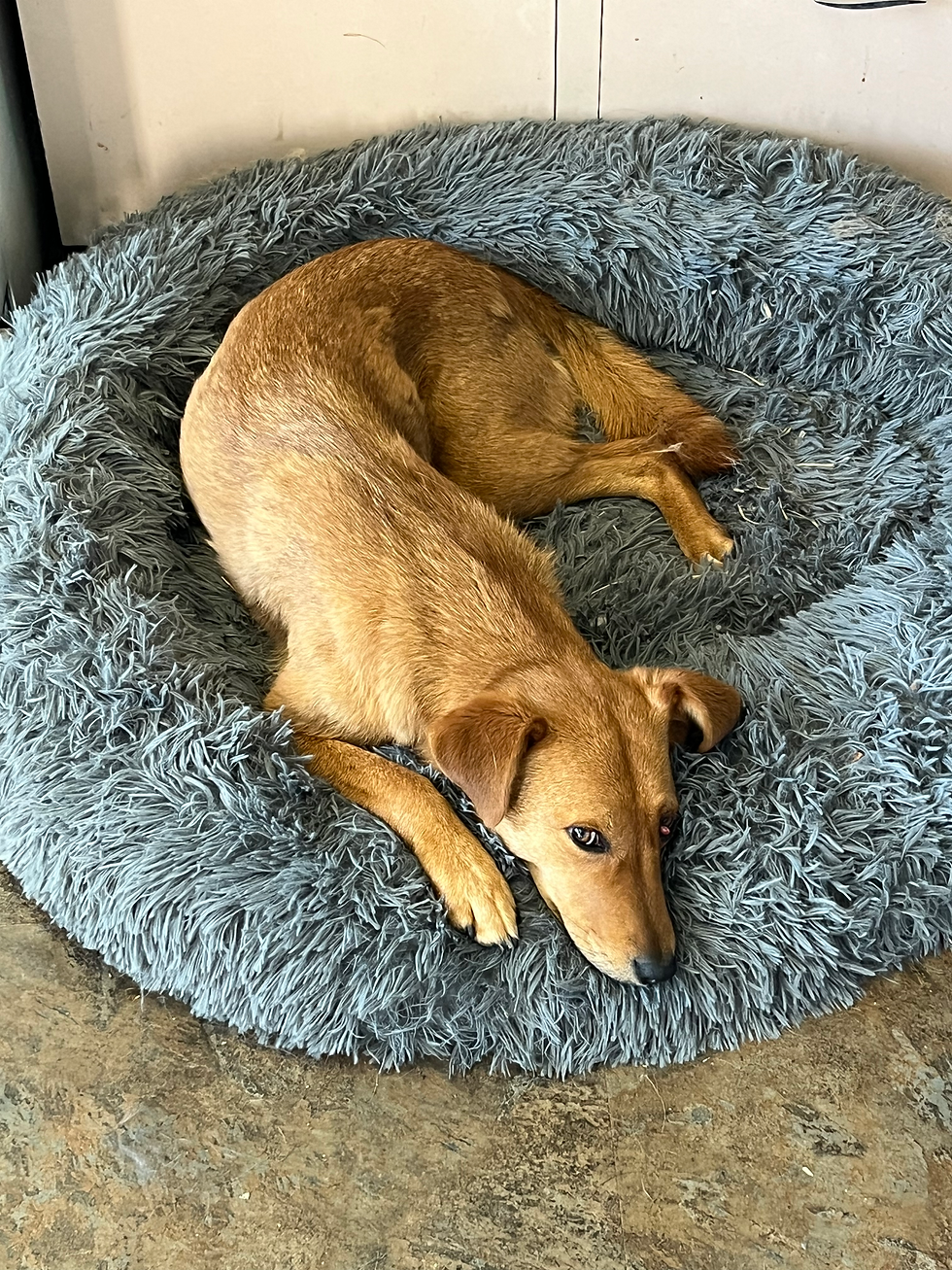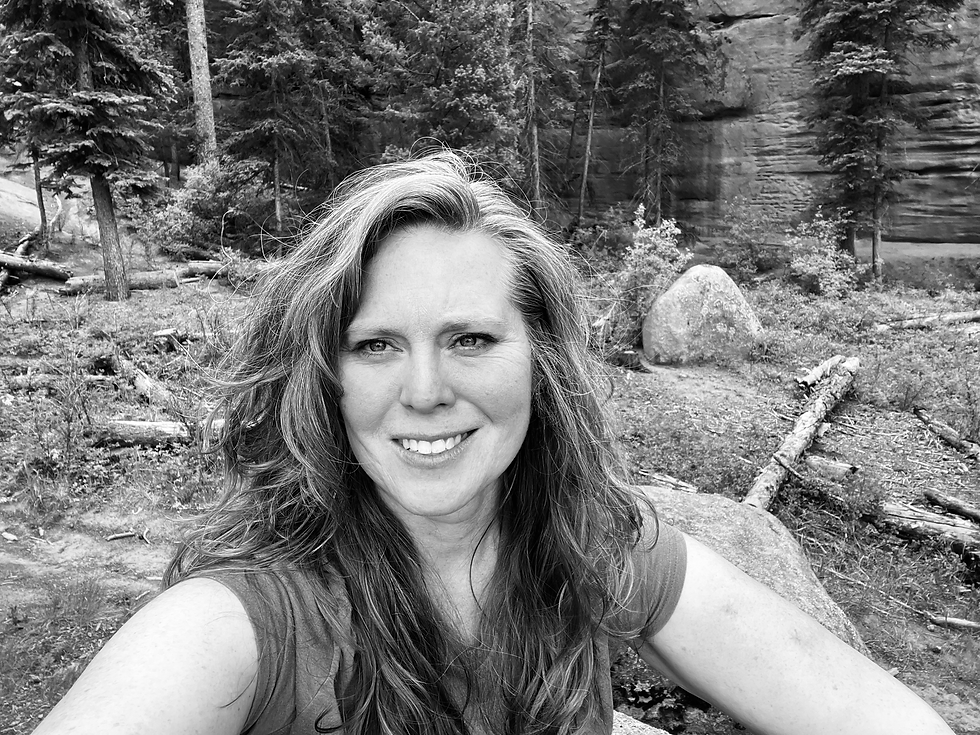It Was Never Just the Cherry Eye
- mrglhic
- Jul 2
- 4 min read
Part I of the Zen Series

Her name is Zen.She survived the streets of Texas, got caged, and learned to perform for safety.
She learned to freeze and fawn. To be good. To disappear.
And today, she let herself be seen.
This isn’t a before-and-after.
This is during.
This is presence in process.
And maybe that’s what healing really is.
Not what changes on the outside.
But what we finally feel safe enough to let through.
The cherry eye is still there.
There’s no dramatic before-and-after, no healed photo to prove that what happened mattered.
But I know something changed—because today, for the first time, Zen let me in.
She stayed.
She let me hold her.
She let me feel into the scaffolding of survival that her body has been gripping for years.
In the end, she relaxed her head onto my knee for the first time.
And even though the visible symptom—the prolapsed tear gland, the thing people point to in public and ask “what’s wrong with her?”—hasn’t gone away, I know we’re not in the same place we were yesterday.
This morning reminded me, forcefully, that I’m not immune to the very patterns I guide other people through.
It’s not easy to sit in the pain of a being you love when you have no visible proof that anything’s getting better.
It’s not easy to be present when your mind is screaming to fix it, when your finances say you can’t, and when the systems around you keep whispering:“See? You should’ve done the surgery.”It’s not easy—and I needed to be reminded of that.
Because just yesterday, I felt my frustration rise around a parent who couldn’t sit in her child’s pain.
Who needed me to be the solution, the distraction, the fixer.
And I judged her.
But this morning, Zen handed me the mirror.
See how easy it is for you?
It’s not that fucking easy.
It never was.
That’s the thing about projection: it doesn’t let you off the hook.
I was angry at her because I was angry at myself.
Because deep down, I knew I was doing the same thing with Zen.
If I could just fix it—just get rid of the eye, make it look okay, get past it—then maybe I wouldn’t have to feel so fucking helpless.
Maybe I wouldn’t have to sit with the truth that I don’t have the money, I don’t have the plan, I don’t have the outcome.
I only have my presence.
And that feels like not enough.
But when I finally stopped projecting, stopped outsourcing the discomfort—I could finally sit with her.
And that’s when she let me in.
It feels like it’s not enough—just being present—because we’ve been systematically entrained to believe that presence doesn’t count.
That unless there’s proof, performance, productivity, a visible shift—we’ve failed.
So we scramble to fix, to suppress, to outsource, to achieve… and somewhere along the way, we leave ourselves.
Until we become ghosts inside our own bodies.
But what if that’s the real wound?
And what if presence is the real medicine?
Not presence as performance.
Not presence that rushes or proves or does.
But the kind that sits with a trembling dog for the first time, and does nothing but feel her breathing change.
The kind that stays even though it aches.
The kind that doesn’t need the eye to look different to know that the whole system shifted.
That kind of presence reorganizes everything.
Not in an instant. Not in a dramatic sweep.
But in slow, cellular, irreversible ways.
And it’s not easy.
Because when we start to come back into our bodies, we feel it all:
The grief of what we didn’t know.
The terror of seeing how widespread the rupture is.
The overwhelm of realizing that the entire society we live in is built on disembodiment and dysregulation—and then blaming each other for the pain it causes.
But what if it was never us against each other?
What if it was always the fight between mind, body, and emotion—inside ourselves?
And what if that fight only exists because embodiment never felt safe enough to return to?
There’s a reason we walked out of it.
And now, some of us are finding our way back in—through dogs, and symptoms, and mirrors that don't lie.
I’m still deep in it.
The cherry eye hasn’t gone away.
The shame hasn’t either.
Somewhere inside, that old story still whispers:“If I were good enough, this never would have happened.”
Because that’s what we’re taught, especially when we grow up as the good baby—the quiet one, the accommodating one.
If we just hold it together, stay small enough, pleasing enough, perfect enough… maybe we’ll be spared.
But that belief builds a nervous system on eggshells.
And when anything goes wrong—when a dog’s eye bulges, or a child struggles, or a body breaks—we turn on ourselves and the self fractures.
Because the only explanation we’ve been given is that it must be our fault.
I’m not past that yet.
But I’m here.
I’m still sitting with her.
And for now, maybe that’s the only medicine we both need.
Not a fix. Not a cure.
Just the slow reweaving of presence where punishment used to live.


